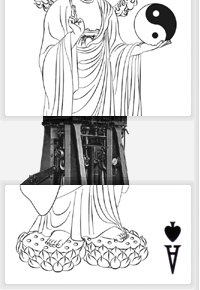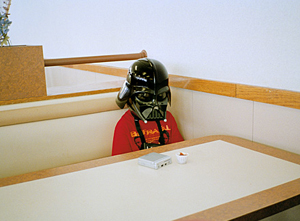
古猶太眾先知均相信在自然界中潛藏著無處不在的神性,在靜修時觀照萬物從中了悟真理,《以賽亞書》 6:3 的「祂的榮光充滿全地」就是指「神在全地」,在《耶利米書》23:24 神亦曾申述「我豈不充滿天地麼」。猶太解經書《米大示》提出了「神就是宇宙的棲息所,宇宙卻不是神的棲息所」之說,第一世紀猶太哲學家斐羅 (Philo of Alexandria) 則如此詮釋《創世記》28:11 :「神被稱為『地方』(ha Makom) ,基於祂囊括著整個宇宙,然而祂卻不被任何事物所囊括」,兩種說法皆表明了神屬性的兩層面,臨在的神性(智慧)既在萬物中,超越的神性(不可知之源)同時卻凌駕於一切,這就是猶太教中最常見的神觀 — 「萬有在神論」 (Panentheism) 。
在十六世紀猶太秘學宗師拉比以撒路利亞 (Isaac Luria) 教授的宇宙觀中,太初的萬有本源「無量」(Ein Sof) 在其自身的無限中緊縮成「混沌界」(Olam ha Tohu) ,即《創世記》1:2 的「地是空虛混沌」,讓阿當卡蒙的神光進入其中。然而,此混沌界只能單向接收神光卻不能讓神光作對流去釋放,混沌界超出其可容量繼而粉碎落散,神光碎片自此落入下界成為了萬物內在的「神性星火」 (Nitzotzot) ,為「神的靈運行在水面上」《創 1:2》之際,當中「運行」 (Merachefet, M-R-Ch-P-T) 一字被解讀作「 288 顆神性星火的消逝」(R-P-Ch M-T) 。288 等同於「花」 (Perach, P-R-Ch) ,「 288 顆神性星火」就是太初宇宙一花之原貌,其名字為「爾洛亞」(Eloah,「神」 (Elohim) 一字之單數,女性),即分辨善惡樹,一如靈知派視分辨善惡樹為蘇菲亞祖貽之化身。地上的活物及死物內裡各自均有著此「 288 顆神性星火」,就像阿當卡蒙有著神的完整形像,十八世紀哈西德正統派猶太教創始人拉比以色列.本.以利以謝 (Yisroel ben Eliezer) 就此解說:
住在石頭、花卉及眾生中的神性星火
皆有著完整數目的肋骨和肌肉之全形,
基於祂被困在其中,使祂不能伸展和說話,
頭部亦要俯伏在膝蓋上。
因此,解放萬物當中的神性星火就成了猶太秘學及哈西德正統派猶太教的刻心教導,此救贖過程稱為「修好世界」 (Tikkun ha Olam) 。「修好世界」的方法就是眾人靠著行善、行義、守律、禱告和默觀各種修行方法達至一心不亂的定境 (Kavanah) ,此「定」就是解放周遭困在萬物中的神性星火之鑰匙,集合祂們以還原太初阿當卡蒙宇宙一體的圓滿狀態(所謂的「彌賽亞」來臨之真義),亦是臨在的神性(智慧)和超越的神性(不可知之源)進行聖婚重新結合之時。猶太教中特別提及了在人道方法下殺生作食用以盡量減少動物所承受的痛苦,並且不浪費食物,這樣尊重生命的態度亦是「修好世界」的方法之一,簡而言之,「修好世界」就是對我們周遭環境的愛惜和對人事的關懷。有別於其他宗教的救贖觀,「修好世界」乃關乎整個宇宙的進程,靠著人們生生世世輪轉 (Gilgul ha Neshamot) 中持續進行,是漸進和漫長的,此救贖之目的亦不是為著個人得救或永生之樂,而是為著成就最終萬有歸一的普世救贖,是人類與生俱來共同分享著的義務。
不少學者相信上述猶太秘學中「神性星火」之說乃是源於靈知派。靈知派相信至高不可知的一源在太初萌生一念而成了智慧的蘇菲亞 / 芭碧羅 (Barbelo),接著此神性智慧之部份不自覺地落入混沌中衍生了物質世界,懵然不知的把自己困在其中,從而成為了萬物中的神性星火,與拉比以撒路利亞的宇宙觀可是異曲同工。原來高處的智慧見狀便作為光進入黑暗的下界喚醒沉睡在當中的神性星火,打碎物質的枷鎖解放祂們,好讓祂們能復歸予其本源 ― 芭碧羅及其上之不可知的一源。《拿戈瑪第古本》的《首意念之三形》中芭碧羅在神性啟示中就以「我就是萬有」和「就在萬有之內」表明了自己為萬物中的神性星火,無處不在的源動力:
我是不可見的一位,就在萬有之內。
是我協輔一眾隱匿者,
因著我知悉一切在萬有之內的。
......
我是萬有之首,我先存於萬有,
我就是萬有,因著我就在每一個人之中。
......
我是照亮萬有的光。
我降臨物質世界並成為我同胞中喜樂的光,
為了源自純潔的蘇菲亞而出、
落入物質世界並困在其中的靈。
這樣,芭碧羅既是太初創造萬物及落入其中的神性智慧,亦是後來為著解放與她本同質的同胞們再次降臨物質世界的救贖之光。耶穌在《多馬福音》77 中則作出了與上述芭碧羅同出一轍的宣告:
我是照亮萬有的光,我就是一切。
萬有自我而出,又復歸予我。
劈開木頭,我在裡面;
舉起石頭,你必在那裡找到我。
這裡基督宣稱萬有乃是自祂而出,自己就在萬物中,同時亦一如芭碧羅所說指自己是「照亮萬有的光」,換言之,祂把自己完全等同為太初與不可知和超越的神性同在之道(智慧的交替) ― 芭碧羅,即無處不在的臨在神性,在《拿戈瑪第古本》的《約翰秘傳之書》中祂亦指自己曾一如芭碧羅般三次降臨下界,以示自己即芭碧羅。《約翰福音》的作者必然理解此關連,這樣他才會以「太初有道,道與神同在 ...... 萬物是藉著祂造的」作開端,在 8:12 引述 「我是世界的光」及 1:9 以第三身覆述的真光「照亮一切生在世上的人」就是分拆自一更早的褔音語錄 ― 基督在《多馬福音》77 第一身直述的「我是照亮萬有的光」。如此基督作為臨在神性的全部並在萬物中之說可見於正典《歌羅西書》 3:11 「惟有基督是一切,又在一切之內」及《歌林多前書》15:28 籍著基督的歸服「叫神作萬有中的一切」。同自《拿戈瑪第古本》的《西拉之教導》有著媲美《約翰福音》的「基督論」,一如《多馬福音》77 指基督作為照亮萬有的光及是一切,那是住在萬有裡面的無形基督 :
一切就是基督,
祂從永有者承傳了萬有。
基督就是不朽的意念,祂是照亮著和無垢的光。
太陽照耀每一骯髒處,而其卻不受染污。
基督亦是如此:就算祂身在貧乏,祂卻不見貧乏。
祂既已誕生,又是不曾誕生。
基督亦是如此:祂既是可被知悉的,
然而祂的隱藏屬靈實相卻是無法參透的。
基督就是一切。
沒有找著一切的決不能知悉基督。
在《多馬福音》77 中基督除了指萬有是自祂而出且自己在萬物中外,祂同時說到一切最終將「復歸予我」,這亦是芭碧羅多次降臨喚醒世人之最終目的,在《首意念之三形》中她將集合原已落散神性星火使之歸復予太初獨一之形:
原已落散的意念將以獨一之形再現,
黑暗混沌勢必瓦解,
[一切將歸復予] 無法估量之 [寂靜] 中的 [無法參透之意念],
直至我向所有同胞們顯現並集合他們在我的永恆國度中之時。
我向他們展示五封印就是為了讓我能住在他們中間,
而他們亦住在我當中。
這樣說,太初獨一之形既是基督,同時亦是芭碧羅,兩者皆為猶太秘學中宇宙一體完美人阿當卡蒙的交替稱呼。在教父伊皮法紐 (Epiphanius of Salamis) 作品引用的不明《腓力福音》段落中,基督教授門徒以此回答天門阻撓者:「我已知悉自己,我亦已從各處集合我自己」,此「自己」就是指無處不在和就在萬有中的臨在的神性,一如耶穌覺知自己本自芭碧羅,了悟萬有皆一體、眾生本無異之理,作為智慧去集合其他困在萬物中智慧,靠著個人內在小宇宙的自性覺醒從而成就大宇宙中萬有歸一的美景,這就是「靈知」 (Gnosis) 。
如此萬有最終歸復至太初的獨一狀態在斯多葛派、中柏拉圖主義及早期基督教稱為「修復」 (Apocatastasis) ,此字曾出現在《使徒行傳》3:21:「天必留祂,等到萬物『修復』的時候」。影響著古今整個基督教的第二世紀教父俄利根 (Origen) 以此字作為世人最終一同修復至一如太初與神同在之說,他主張世人在太初有著一先存完美的屬靈狀態,並稱之為「意念」,此「意念」為一嚐自立而離開了至善的神,落入物質界減卻了神性,甚至化為動植物。本著自由意志的法則,神沒有強迫「意念」重返其中,反之,神造出了宇宙作為世人和萬物的靈修場所,讓他們在裡面生生世世地磨練和經歷而逐層提昇,最終得以歸復其永恆中,而基督就是作為此修復過程中世人的典範。基於最終的歸復是完美無缺的,此說亦同時推翻了永死和地獄存在的可能性。俄利根之說既有著睿智派中首意念芭碧羅作為不可知者在太初的伴侶散落下界並將在最終重返其懷抱之影子,與猶太教的「修好世界」中世人透過輪迴轉世而達至最終眾生皆得救的說法更是同出一轍。「修復論」在第四至五世紀的教會中相當普及,教父貴格利 (Gregory of Nyssa) 、塔爾索的狄奧多 (Diodore of Tarsus) 及摩普綏提亞的狄奧多 (Theodore of Mopsuestia) 均曾公開教授此說,直到 400 年後第六世紀的羅馬王查士丁尼一世方籍著君士坦丁堡第二屆大公會議將俄利根的「修復論」定性為異端學說。近代基督教中則有浸信會的前身「重洗派」 (Anabaptism) 、「貴格會」 (Quaker) 、 「普救派」 (Univeralism) 及俗稱「摩門教」的「耶穌基督後期聖徒教會」持類近俄利根「修復論」的救贖觀。


 This kid was sitting there on his own wearing a
This kid was sitting there on his own wearing a

